2023-2024学年七年级英语下册Module 11 Body language短文选词填空训练(含解析)
文档属性
| 名称 | 2023-2024学年七年级英语下册Module 11 Body language短文选词填空训练(含解析) | 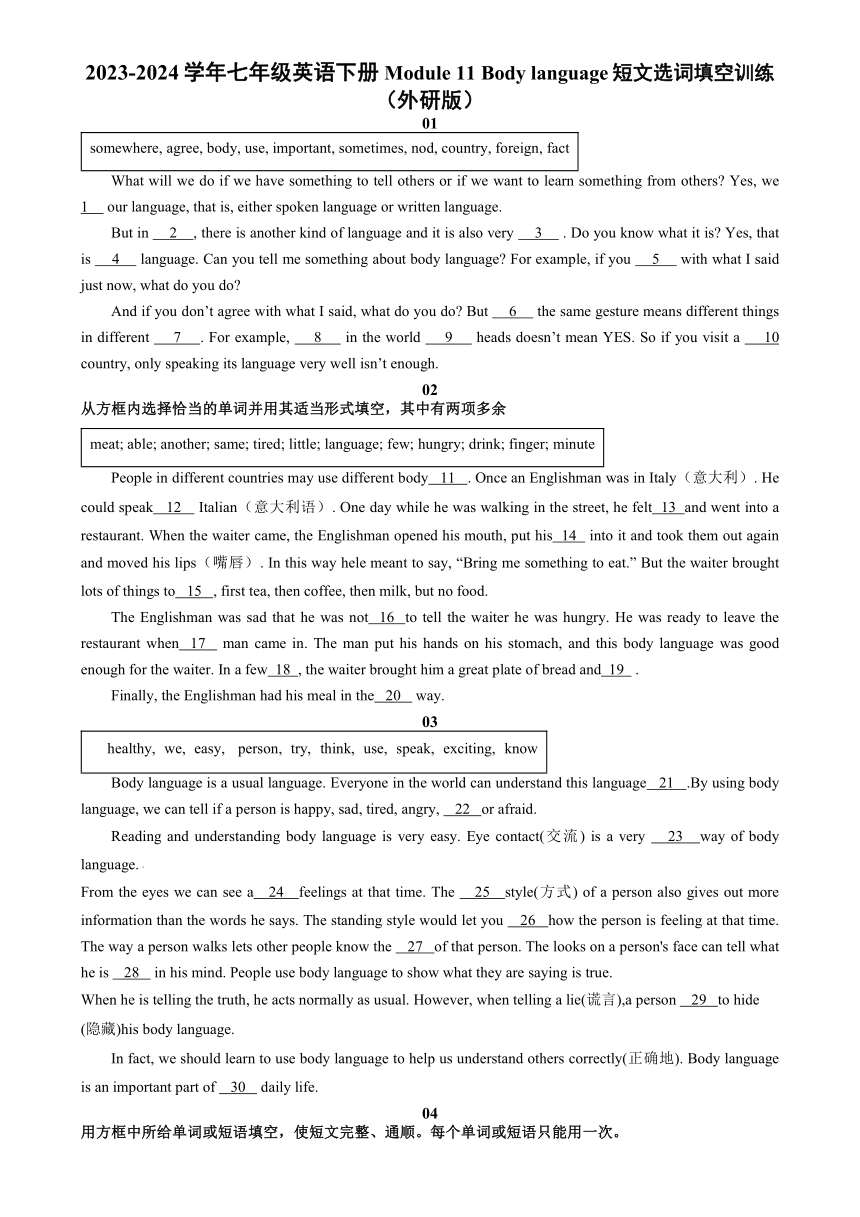 | |
| 格式 | docx | ||
| 文件大小 | 48.5KB | ||
| 资源类型 | 教案 | ||
| 版本资源 | 外研版 | ||
| 科目 | 英语 | ||
| 更新时间 | 2024-05-29 14:10:11 | ||
图片预览

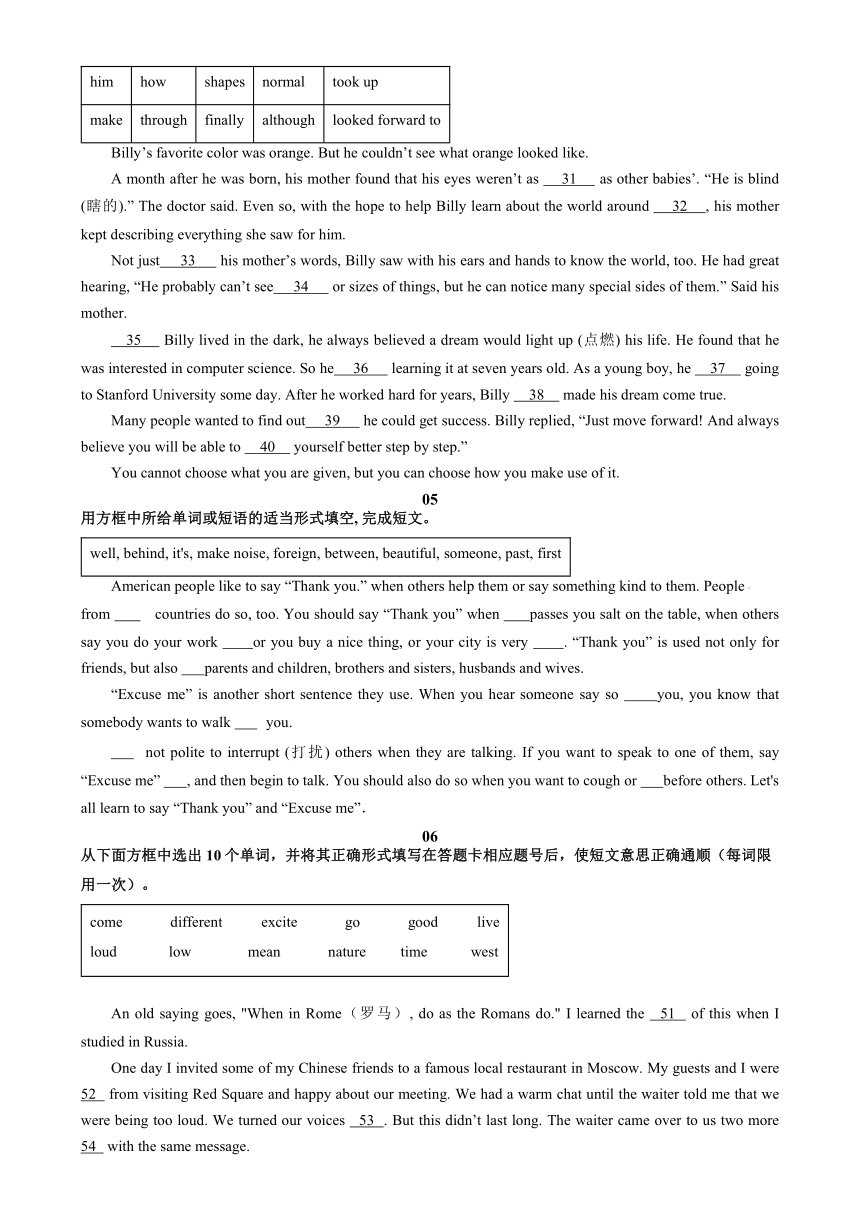
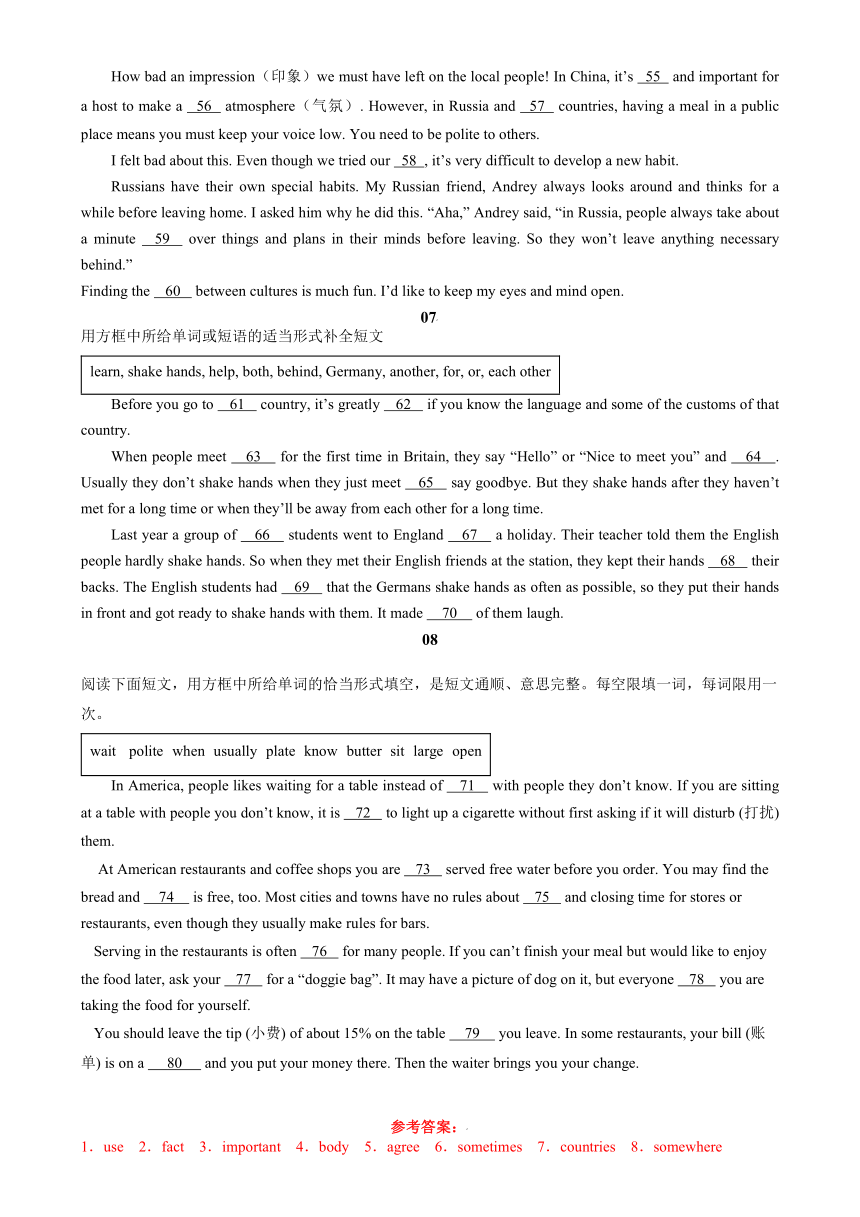
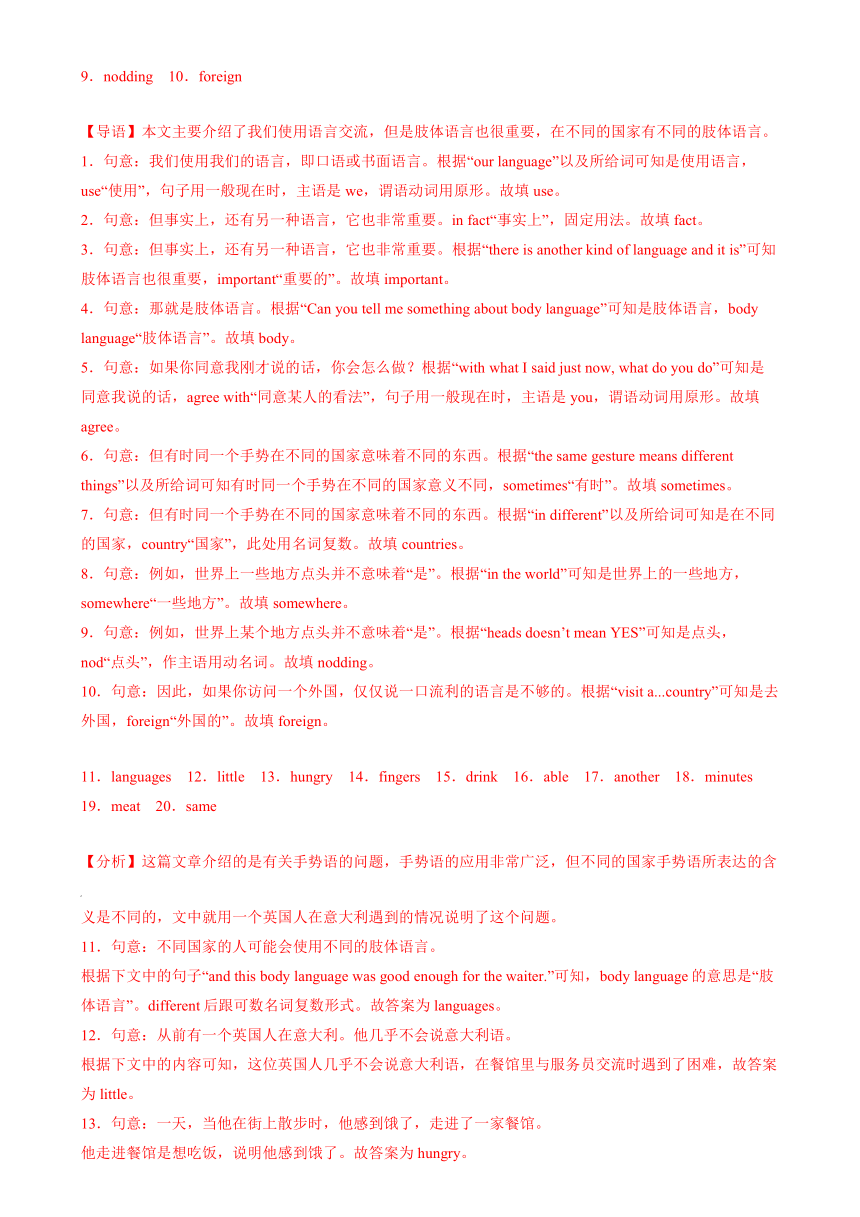
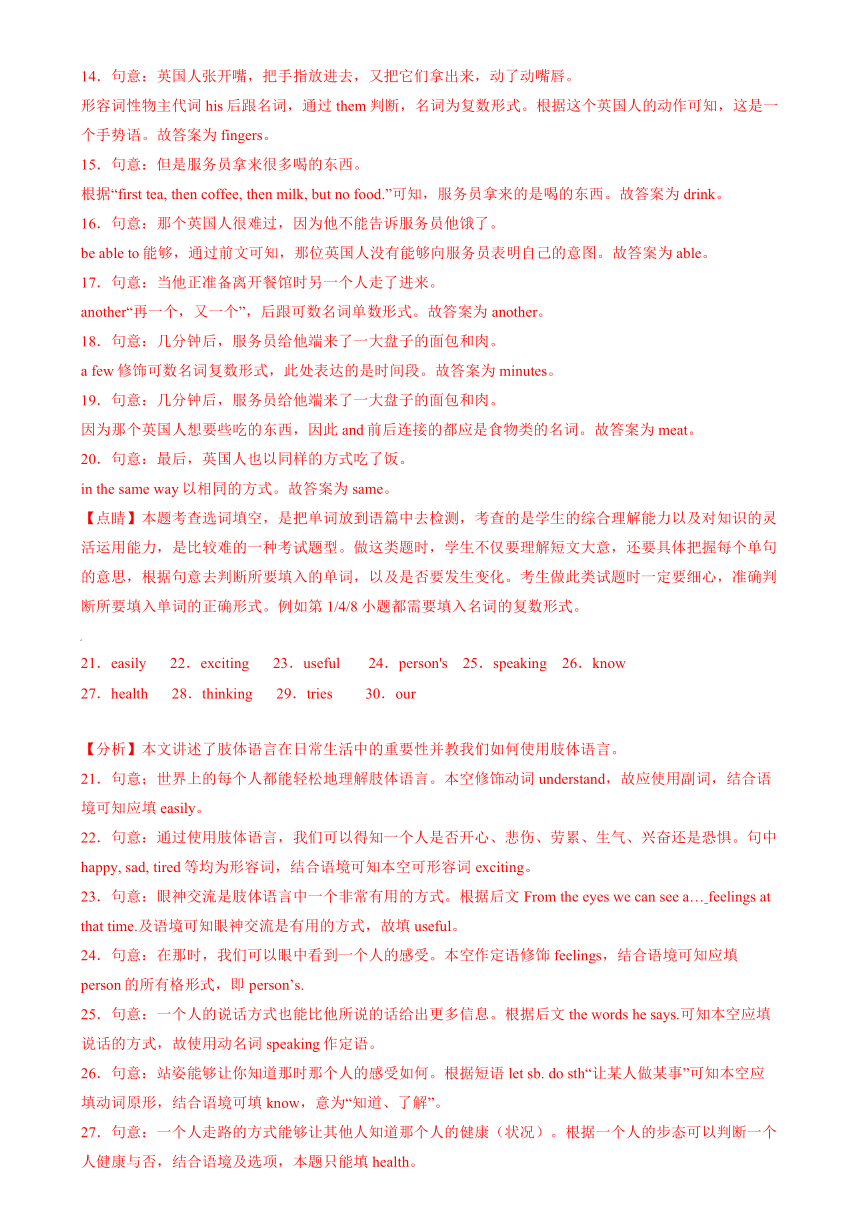
文档简介
2023-2024学年七年级英语下册Module 11 Body language短文选词填空训练(外研版)
01
somewhere, agree, body, use, important, sometimes, nod, country, foreign, fact
What will we do if we have something to tell others or if we want to learn something from others Yes, we 1 our language, that is, either spoken language or written language.
But in 2 , there is another kind of language and it is also very 3 . Do you know what it is Yes, that is 4 language. Can you tell me something about body language For example, if you 5 with what I said just now, what do you do
And if you don’t agree with what I said, what do you do But 6 the same gesture means different things in different 7 . For example, 8 in the world 9 heads doesn’t mean YES. So if you visit a 10 country, only speaking its language very well isn’t enough.
02
从方框内选择恰当的单词并用其适当形式填空,其中有两项多余
meat; able; another; same; tired; little; language; few; hungry; drink; finger; minute
People in different countries may use different body 11 . Once an Englishman was in Italy(意大利). He could speak 12 Italian(意大利语). One day while he was walking in the street, he felt 13 and went into a restaurant. When the waiter came, the Englishman opened his mouth, put his 14 into it and took them out again and moved his lips(嘴唇). In this way hele meant to say, “Bring me something to eat.” But the waiter brought lots of things to 15 , first tea, then coffee, then milk, but no food.
The Englishman was sad that he was not 16 to tell the waiter he was hungry. He was ready to leave the restaurant when 17 man came in. The man put his hands on his stomach, and this body language was good enough for the waiter. In a few 18 , the waiter brought him a great plate of bread and 19 .
Finally, the Englishman had his meal in the 20 way.
03
healthy, we, easy, person, try, think, use, speak, exciting, know
Body language is a usual language. Everyone in the world can understand this language 21 .By using body language, we can tell if a person is happy, sad, tired, angry, 22 or afraid.
Reading and understanding body language is very easy. Eye contact(交流) is a very 23 way of body language.
From the eyes we can see a 24 feelings at that time. The 25 style(方式) of a person also gives out more information than the words he says. The standing style would let you 26 how the person is feeling at that time. The way a person walks lets other people know the 27 of that person. The looks on a person's face can tell what he is 28 in his mind. People use body language to show what they are saying is true.
When he is telling the truth, he acts normally as usual. However, when telling a lie(谎言),a person 29 to hide (隐藏)his body language.
In fact, we should learn to use body language to help us understand others correctly(正确地). Body language is an important part of 30 daily life.
04
用方框中所给单词或短语填空,使短文完整、通顺。每个单词或短语只能用一次。
him how shapes normal took up
make through finally although looked forward to
Billy’s favorite color was orange. But he couldn’t see what orange looked like.
A month after he was born, his mother found that his eyes weren’t as 31 as other babies’. “He is blind (瞎的).” The doctor said. Even so, with the hope to help Billy learn about the world around 32 , his mother kept describing everything she saw for him.
Not just 33 his mother’s words, Billy saw with his ears and hands to know the world, too. He had great hearing, “He probably can’t see 34 or sizes of things, but he can notice many special sides of them.” Said his mother.
35 Billy lived in the dark, he always believed a dream would light up (点燃) his life. He found that he was interested in computer science. So he 36 learning it at seven years old. As a young boy, he 37 going to Stanford University some day. After he worked hard for years, Billy 38 made his dream come true.
Many people wanted to find out 39 he could get success. Billy replied, “Just move forward! And always believe you will be able to 40 yourself better step by step.”
You cannot choose what you are given, but you can choose how you make use of it.
05
用方框中所给单词或短语的适当形式填空, 完成短文。
well, behind, it's, make noise, foreign, between, beautiful, someone, past, first
American people like to say “Thank you.” when others help them or say something kind to them. People
from countries do so, too. You should say “Thank you” when passes you salt on the table, when others say you do your work or you buy a nice thing, or your city is very . “Thank you” is used not only for friends, but also parents and children, brothers and sisters, husbands and wives.
“Excuse me” is another short sentence they use. When you hear someone say so you, you know that somebody wants to walk you.
not polite to interrupt (打扰) others when they are talking. If you want to speak to one of them, say “Excuse me” , and then begin to talk. You should also do so when you want to cough or before others. Let's all learn to say “Thank you” and “Excuse me”.
06
从下面方框中选出10个单词,并将其正确形式填写在答题卡相应题号后,使短文意思正确通顺(每词限用一次)。
come different excite go good live loud low mean nature time west
An old saying goes, "When in Rome(罗马), do as the Romans do." I learned the 51 of this when I studied in Russia.
One day I invited some of my Chinese friends to a famous local restaurant in Moscow. My guests and I were 52 from visiting Red Square and happy about our meeting. We had a warm chat until the waiter told me that we were being too loud. We turned our voices 53 . But this didn’t last long. The waiter came over to us two more 54 with the same message.
How bad an impression(印象)we must have left on the local people! In China, it’s 55 and important for a host to make a 56 atmosphere(气氛). However, in Russia and 57 countries, having a meal in a public place means you must keep your voice low. You need to be polite to others.
I felt bad about this. Even though we tried our 58 , it’s very difficult to develop a new habit.
Russians have their own special habits. My Russian friend, Andrey always looks around and thinks for a while before leaving home. I asked him why he did this. “Aha,” Andrey said, “in Russia, people always take about a minute 59 over things and plans in their minds before leaving. So they won’t leave anything necessary behind.”
Finding the 60 between cultures is much fun. I’d like to keep my eyes and mind open.
07
用方框中所给单词或短语的适当形式补全短文
learn, shake hands, help, both, behind, Germany, another, for, or, each other
Before you go to 61 country, it’s greatly 62 if you know the language and some of the customs of that country.
When people meet 63 for the first time in Britain, they say “Hello” or “Nice to meet you” and 64 . Usually they don’t shake hands when they just meet 65 say goodbye. But they shake hands after they haven’t met for a long time or when they’ll be away from each other for a long time.
Last year a group of 66 students went to England 67 a holiday. Their teacher told them the English people hardly shake hands. So when they met their English friends at the station, they kept their hands 68 their backs. The English students had 69 that the Germans shake hands as often as possible, so they put their hands in front and got ready to shake hands with them. It made 70 of them laugh.
08
阅读下面短文,用方框中所给单词的恰当形式填空,是短文通顺、意思完整。每空限填一词,每词限用一次。
wait polite when usually plate know butter sit large open
In America, people likes waiting for a table instead of 71 with people they don’t know. If you are sitting at a table with people you don’t know, it is 72 to light up a cigarette without first asking if it will disturb (打扰) them.
At American restaurants and coffee shops you are 73 served free water before you order. You may find the bread and 74 is free, too. Most cities and towns have no rules about 75 and closing time for stores or restaurants, even though they usually make rules for bars.
Serving in the restaurants is often 76 for many people. If you can’t finish your meal but would like to enjoy the food later, ask your 77 for a “doggie bag”. It may have a picture of dog on it, but everyone 78 you are taking the food for yourself.
You should leave the tip (小费) of about 15% on the table 79 you leave. In some restaurants, your bill (账单) is on a 80 and you put your money there. Then the waiter brings you your change.
参考答案:
1.use 2.fact 3.important 4.body 5.agree 6.sometimes 7.countries 8.somewhere 9.nodding 10.foreign
【导语】本文主要介绍了我们使用语言交流,但是肢体语言也很重要,在不同的国家有不同的肢体语言。
1.句意:我们使用我们的语言,即口语或书面语言。根据“our language”以及所给词可知是使用语言,use“使用”,句子用一般现在时,主语是we,谓语动词用原形。故填use。
2.句意:但事实上,还有另一种语言,它也非常重要。in fact“事实上”,固定用法。故填fact。
3.句意:但事实上,还有另一种语言,它也非常重要。根据“there is another kind of language and it is”可知肢体语言也很重要,important“重要的”。故填important。
4.句意:那就是肢体语言。根据“Can you tell me something about body language”可知是肢体语言,body language“肢体语言”。故填body。
5.句意:如果你同意我刚才说的话,你会怎么做?根据“with what I said just now, what do you do”可知是同意我说的话,agree with“同意某人的看法”,句子用一般现在时,主语是you,谓语动词用原形。故填agree。
6.句意:但有时同一个手势在不同的国家意味着不同的东西。根据“the same gesture means different things”以及所给词可知有时同一个手势在不同的国家意义不同,sometimes“有时”。故填sometimes。
7.句意:但有时同一个手势在不同的国家意味着不同的东西。根据“in different”以及所给词可知是在不同的国家,country“国家”,此处用名词复数。故填countries。
8.句意:例如,世界上一些地方点头并不意味着“是”。根据“in the world”可知是世界上的一些地方,somewhere“一些地方”。故填somewhere。
9.句意:例如,世界上某个地方点头并不意味着“是”。根据“heads doesn’t mean YES”可知是点头,nod“点头”,作主语用动名词。故填nodding。
10.句意:因此,如果你访问一个外国,仅仅说一口流利的语言是不够的。根据“visit a...country”可知是去外国,foreign“外国的”。故填foreign。
11.languages 12.little 13.hungry 14.fingers 15.drink 16.able 17.another 18.minutes 19.meat 20.same
【分析】这篇文章介绍的是有关手势语的问题,手势语的应用非常广泛,但不同的国家手势语所表达的含
义是不同的,文中就用一个英国人在意大利遇到的情况说明了这个问题。
11.句意:不同国家的人可能会使用不同的肢体语言。
根据下文中的句子“and this body language was good enough for the waiter.”可知,body language的意思是“肢体语言”。different后跟可数名词复数形式。故答案为languages。
12.句意:从前有一个英国人在意大利。他几乎不会说意大利语。
根据下文中的内容可知,这位英国人几乎不会说意大利语,在餐馆里与服务员交流时遇到了困难,故答案为little。
13.句意:一天,当他在街上散步时,他感到饿了,走进了一家餐馆。
他走进餐馆是想吃饭,说明他感到饿了。故答案为hungry。
14.句意:英国人张开嘴,把手指放进去,又把它们拿出来,动了动嘴唇。
形容词性物主代词his后跟名词,通过them判断,名词为复数形式。根据这个英国人的动作可知,这是一个手势语。故答案为fingers。
15.句意:但是服务员拿来很多喝的东西。
根据“first tea, then coffee, then milk, but no food.”可知,服务员拿来的是喝的东西。故答案为drink。
16.句意:那个英国人很难过,因为他不能告诉服务员他饿了。
be able to能够,通过前文可知,那位英国人没有能够向服务员表明自己的意图。故答案为able。
17.句意:当他正准备离开餐馆时另一个人走了进来。
another“再一个,又一个”,后跟可数名词单数形式。故答案为another。
18.句意:几分钟后,服务员给他端来了一大盘子的面包和肉。
a few修饰可数名词复数形式,此处表达的是时间段。故答案为minutes。
19.句意:几分钟后,服务员给他端来了一大盘子的面包和肉。
因为那个英国人想要些吃的东西,因此and前后连接的都应是食物类的名词。故答案为meat。
20.句意:最后,英国人也以同样的方式吃了饭。
in the same way以相同的方式。故答案为same。
【点睛】本题考查选词填空,是把单词放到语篇中去检测,考查的是学生的综合理解能力以及对知识的灵活运用能力,是比较难的一种考试题型。做这类题时,学生不仅要理解短文大意,还要具体把握每个单句的意思,根据句意去判断所要填入的单词,以及是否要发生变化。考生做此类试题时一定要细心,准确判断所要填入单词的正确形式。例如第1/4/8小题都需要填入名词的复数形式。
21.easily 22.exciting 23.useful 24.person's 25.speaking 26.know 27.health 28.thinking 29.tries 30.our
【分析】本文讲述了肢体语言在日常生活中的重要性并教我们如何使用肢体语言。
21.句意;世界上的每个人都能轻松地理解肢体语言。本空修饰动词understand,故应使用副词,结合语境可知应填easily。
22.句意:通过使用肢体语言,我们可以得知一个人是否开心、悲伤、劳累、生气、兴奋还是恐惧。句中happy, sad, tired等均为形容词,结合语境可知本空可形容词exciting。
23.句意:眼神交流是肢体语言中一个非常有用的方式。根据后文From the eyes we can see a… feelings at that time.及语境可知眼神交流是有用的方式,故填useful。
24.句意:在那时,我们可以眼中看到一个人的感受。本空作定语修饰feelings,结合语境可知应填person的所有格形式,即person’s.
25.句意:一个人的说话方式也能比他所说的话给出更多信息。根据后文the words he says.可知本空应填说话的方式,故使用动名词speaking作定语。
26.句意:站姿能够让你知道那时那个人的感受如何。根据短语let sb. do sth“让某人做某事”可知本空应填动词原形,结合语境可填know,意为“知道、了解”。
27.句意:一个人走路的方式能够让其他人知道那个人的健康(状况)。根据一个人的步态可以判断一个人健康与否,结合语境及选项,本题只能填health。
28.句意:一个人脸上的表情能够告诉你他在他的头脑中正在思考什么。根据本题语境及所给词可判断应填动词“思考”,由于句中出现be动词is,故应将think变为现在分词thinking,从而构成现在进行时态结构。
29.句意:然而,当他们撒谎,一个人会设法隐藏他的肢体语言。根据语境及所给词汇可知本题考查try to do sth.“设法做某事”,由于本句主语为person,故谓语动词应使用单三形式,故填tries。
30.句意:肢体语言是我们日常生活中重要的一部分。本空作定语修饰daily life, 结合语境及所给词汇可判断应填形容词性物主代词our。
31.normal 32.him 33.through 34.shapes 35.Although 36.took up 37.looked forward to 38.finally 39.how 40.make
【分析】短文大意:本文是一篇励志小故事,讲述了盲童比利是如何在妈妈的帮助下用耳朵和手去认识世界的,说明梦想会照亮我们生活的道理。
31.句意:他出生一个月后,他的母亲发现他的眼睛不像其他婴儿一样正常。“as +形容词+ as”表示“和……一样……”;根据句意结构和上下文He is blind提示,可知不正常,故填normal。
32.句意:尽管如此,为了帮助比利了解周围的世界,他的妈妈还是不停地给他描述她看到的一切。around sb. 围绕某人/在某人周围;根据句意结构和上下文提示,可知填him。
33.句意:比利不仅通过妈妈的话,还用耳朵和手去认识世界。through通过,表方式;through one's words通过某人的话,根据句意结构和上下文提示,可知填through。
34.句意:他可能看不见物体的形状或大小。or或者,连接并列结构;根据后面or sizes of things和上下文提示,可知用复数名词,故填shapes。
35.句意:虽然比利生活在黑暗中,他总是相信一个梦想会照亮他的生活。本句前后是让步关系,需用although连接;根据句意结构和上下文提示,可知填Although。
36.句意:所以他在七岁的时候开始学习。take up doing sth.开始做某事;at seven years old在七岁的时候,是过去的时间,用于一般过去时;根据句意结构和上下文提示,可知填took up。
37.句意:作为一个小男孩,他期待着有一天能去斯坦福大学。look forward to doing期待做某事;根据句意时态和上下文提示,可知填looked forward to。
38.句意:经过多年的努力,比利终于实现了他的梦想。finally最终;根据句意语境和上下文提示,可知填finally。
39.句意:人们想知道他是如何取得成功的。本句是宾语从句,空白处在从句中表方式,需用how引导;根据句意结构和上下文提示,可知填how。
40.句意:往前走!永远相信你能一步一步让自己变得更好。make yourself better让自己变得更好;be able to能够,后接不定式;根据句意结构和上下文提示,可知填make。
41.foreign 42.someone 43.well 44.beautiful 45.between 46.behind 47.past 48.It's 49.first 50.make noise
【分析】这篇短文主要讲述了什么场合说“Thank you”“Excuse me”。
41.句意:当别人帮助他们或对他们说些好话时,美国人喜欢说“谢谢”。来自外国的人也这样做。
根据上文“American people like to say “Thank you.” when others help them or say something kind to them.”可
知,这里是说来自外国的人们也是这样。foreign形容词,外国的。根据句意,故答案为foreign。
42.句意:当有人把盐递给你时,你应该说“谢谢”。
这里是说当有人递给你盐时,这里用someone某人。根据题意,故答案为someone。
43.句意:当别人说你工作做得好,或者你买了件好东西,或者你的城市很漂亮。
根据下文“or you buy a nice thing, or your city is very 4 .”可知,这里是说你工作的很好。well副词修饰动词。根据句意,故答案为well。
44.句意:当别人说你工作做得好,或者你买了件好东西,或者你的城市很漂亮。
根据上文“when others say you do your work 3 or you buy a nice thing,”可知这里是你的城市很漂亮。beautiful形容词,漂亮的。根据句意,答案为beautiful。
45.句意:“谢谢”不仅用于朋友,也用于父母和孩子、兄弟姐妹、丈夫和妻子之间。
这里表示两者之间用between…and…。根据题意,故答案为between。
46.句意:当你听到有人这样说,在你身后,你知道有人想从后方超过你。
根据“you know that somebody wants to walk 7 you. ”可知,这里是有人想从后方超过你,这里是说在你身后。behind在……后面;根据题意,故答案为behind。
47.句意:当你听到有人这样说,在你身后,你知道有人想从后方超过你。
根据上文“When you hear someone say so 6 you”可知,这里是说有人从你身后超过你。walk past…走过;根据题意,故答案为past。
48.句意:打断别人说话是不礼貌的。
这里是固定句型,It’s+形容词+to do sth.做某事是……;it在这里是形式主语;根据题意,故答案为It's。
49.句意:如果你想和他们中的一个说话,先说“打扰一下”,然后开始说话。
根据下文“and then begin to talk.”可知,这里是说先说“打扰一下”。first首先。故答案为first。
50.句意:当你想在别人面前咳嗽或发出噪音时,你也应该这样做。
根据“You should also do so when you want to cough”可知,这里是发出噪音。want to do sth.想做某事;根据题意,故答案为make noise。
51.meaning 52.excited 53.lower 54.times 55.natural 56.lively 57.western 58.best 59.to go 60.differences
【分析】本文介绍了作者在俄罗斯学习时,对那里的文化和习俗的认识。
51.meaning
句意:我在俄罗斯学习期间懂得了这句话的含义。根据前文的An old saying goes, “When in Rome(罗马),do as the Romans do.”可知此处指的是这句谚语的意思,the+名词+of,故此处为名词meaning。
52.excited
句意:我和我的客人参观红场非常兴奋,对我们的集会感到高兴。此处与 happy 相并列的,应是兴奋的,作为系动词were的表语,主语My guests and I表示人,故为excited。
53.lower
句意:我们把嗓音变得更低。根据前文的We had a warm chat until the waiter told me that we were being too loud.可知我们声音太大,因此要降低嗓音,故为lower。
54.times
句意:那位服务员带着同样的消息,朝我们又走过来两次。more修饰复数名词,故为times。
55.natural
句意:在中国对于一个主人来说,制造活跃的气氛是自然而然而且非常重要的。此处与important相并列,因此是形容词,故此处为natural。
56.lively
句意:在中国对于一个主人来说,制造活跃的气氛是自然而然而且非常重要的。根据前文的We had a warm chat until the waiter told me that we were being too loud.可知我们大声地,热情地聊天,这是制造活跃的气氛,故此处为lively。
57.western
句意:然而,在俄罗斯和西方国家,在公众场所吃饭意味着要降低嗓音。此处与Russia相并列的应是西方国家,修饰名词countries,故用形容词,故为western。
58.best
句意:尽管我们尽最大努力了,但是养成一个新习惯是非常困难的。try one’s best尽最大努力,故为best。
59.to go
句意:在俄罗斯,人们总是在离开之前,花费大约一分钟在大脑中复习一下东西和计划。Sb takes time to do sth某人花费时间做某事,go over复习,回顾;故此处为to go。
60.differences
句意:找到文化之间的差别更有趣。本文介绍了中国和俄罗斯文化的差别,作为动词find的宾语,故用名词differences。
点睛:根据句意,结合词性,时态,语态,短语,句型和主谓一致,选择适当的单词,用其正确形式填空。例如小题8,句意:尽管我们尽最大努力了,但是养成一个新习惯是非常困难的。try one’s best尽最大努力,故为best。
61.another 62.helpful 63.each other 64.shake hands 65.or 66.German 67.for 68.behind 69.learned/learnt 70.both
【导语】本文介绍了一些社交礼仪以及一群德国学生和他们的英国朋友见面时发生的趣事。
61.句意:在你去另一个国家之前,如果你知道那个国家的语言和一些习俗是非常有帮助。根据“Before you go to...country, it’s greatly...if you know the language and some of the customs of that country.”以及备选词可知,需要了解那个国家的语言和风俗是当你去另一个国家时,another“另一”符合语境。故填another。
62.句意:在你去另一个国家之前,如果你知道那个国家的语言和一些习俗是非常有帮助。根据“Before you go to...country, it’s greatly...if you know the language and some of the customs of that country.”以及备选词可知,旅游时提前了解旅游国家的语言和风俗是很有帮助的,helpful“有帮助的”符合语境,形容词作表语。故填helpful。
63.句意:在英国,当人们第一次见面时,他们会说“你好”或“很高兴见到你”并握手。根据“When people meet...for the first time in Britain, they say ‘Hello’ or ‘Nice to meet you’”以及备选词可知,此处介绍第一次互相见面时的礼仪,each other“互相”符合语境。故填each other。
64.句意:在英国,当人们第一次见面时,他们会说“你好”或“很高兴见到你”并握手。根据下文“Usually they don’t shake hands”和“But they shake hands”可知此处介绍的是握手的礼仪。故填shake hands。
65.句意:通常他们只是见面或道别时不握手。“meet”和“say goodbye”两者是选择关系,结合备选词可知or“或者”符合语境。故填or。
66.句意:去年,一群德国学生去英国度假。根据下文的“The English students had...that the Germans shake hands as often as possible”可知,此处指“德国学生”,空后是名词,空处要用形容词German“德国的”作定语。故填German。
67.句意:去年,一群德国学生去英国度假。for a holiday“度假”。故填for。
68.句意:所以当他们在车站遇到他们的英国朋友时,他们把手放在背后。根据“Their teacher told them the
English people hardly shake hands.”可知,他们的老师告诉他们,英国人几乎不握手,所以他们便把手放在背后,behind“在……后面”符合语境。故填behind。
69.句意:英国学生知道德国人尽可能多地握手,所以他们把手放在前面,准备和他们握手。根据“The English students had...that the Germans shake hands as often as possible”以及备选词可知,此处指英国学生得知德国人尽可能多地握手,learn“获悉,得知”,此处用learn的过去分词learned/learnt与had构成过去完成时。故填learned/learnt。
70.句意:这使他们都笑了。根据“It made...of them laugh.”以及备选词可知,此处应用both of,表示两边的学生。故填both。
71.sitting 72.impolite 73.usually 74.butter 75.opening 76.large 77.waiter 78.knows 79.when 80.plate
【导语】本文主要介绍了美国人在外就餐时的风俗习惯。
71.句意:在美国,人们更愿意等桌子,而不是和不认识的人坐在一起。根据“people likes waiting for a table instead of…with people they don’t know”以及备选词可知,此句表达的是人们更愿意等桌子,而不是和不认识的人坐在一起。横线处缺的汉意是“坐”sit,用于短语“instead of ”之后,“of”是介词,需用动名词形式。故填sitting。
72.句意:如果你和一个不认识的人坐在一起,在事先没有询问是否会打扰到他们就点燃一支香烟是不礼貌的。根据“it is…to light up a cigarette without first asking if it will disturb (打扰) them.”可知,此句表达的是未经别人允许就吸烟,这样的行为是不礼貌的。“ polite”有礼貌的,是形容词;“不礼貌的”是impolite。故填impolite。
73.句意:在美国的餐馆和咖啡店,点菜前通常会免费供应水。根据“At American restaurants and coffee shops you are…served free water before you order.”可知,横线处缺的成分是副词。结合备选词可知,应填频率副词“usually”通常。故填usually。
74.句意:你可能会发现面包和黄油也是免费的。根据“You may find the bread and…is free”可知,横线处的词与“bread”并列,结合备选词可知,应是“butter”黄油,是不可数名词。故填butter。
75.句意:大多数城市和城镇对商店或餐馆的开门和关门时间没有规定,尽管他们通常对酒吧有规定。根据“Most cities and towns have no rules about…and closing time for stores or restaurants,”可知,此处表达的是对商店或餐馆的开门和关门时间没有规定,横线处缺的汉意是“开放”,结合备选词可知,“open”开放,是动
词。“closing”是动名词,“open”其动名词形式是opening。故填opening。
76.句意:餐馆的服务对人们来说是非常广泛的。根据“Serving in the restaurants is often…for many people”可知,此处表达的是餐馆的服务是非常广泛的,“广泛的、大的”large,是形容词,位于系动词“is”之后作表语。故填large。
77.句意:如果你不能吃完你的饭,但想稍后享用食物,可以向服务员寻求一个“狗食袋”。根据“ask your…for a “doggie bag””可知,是向某人要“狗食袋”。根据“Serving in the restaurants is oftenfor many people.”可知,这是在餐馆吃饭,需要“狗食袋”只能是寻求服务员的帮助。“wait”等待,是动词;“服务员”waiter,是可数名词,结合语境,应用其单数形式。故填waiter。
78.句意:它可能有一张狗的照片在上面,但是每个人都知道你是为了给自己带食物。根据“It may have a picture of dog on it, but everyone…you are taking the food for yourself.”可知,此句表达的是食物袋上印着狗的图像,但是人们心里都知道打包的食物是给自己的。横线处缺的汉意是“知道”know,本句的时态是一般现在时,主语是“everyone”,谓语动词需用单数形式。故填knows。
79.句意:当你走的时候要留大约15%的小费。根据“You should leave the tip (小费) of about 15% on the table…you leave.”可知,你离开,你应该留15%的小费,是两个独立的句子,且动作先后发生,需用连词when连接。故填when。
80.句意:在一些餐馆,您的账单在碟子上,把你的钱也放在上面。根据“In some restaurants, your bill (账单) is on a…and you put your money there.”以及备选词可知,在餐馆里,账单应该是在碟子上。“碟子”plate,是可数名词,在句中用于不定冠词“a”之后,需用名词的单数形式。故填plate。
01
somewhere, agree, body, use, important, sometimes, nod, country, foreign, fact
What will we do if we have something to tell others or if we want to learn something from others Yes, we 1 our language, that is, either spoken language or written language.
But in 2 , there is another kind of language and it is also very 3 . Do you know what it is Yes, that is 4 language. Can you tell me something about body language For example, if you 5 with what I said just now, what do you do
And if you don’t agree with what I said, what do you do But 6 the same gesture means different things in different 7 . For example, 8 in the world 9 heads doesn’t mean YES. So if you visit a 10 country, only speaking its language very well isn’t enough.
02
从方框内选择恰当的单词并用其适当形式填空,其中有两项多余
meat; able; another; same; tired; little; language; few; hungry; drink; finger; minute
People in different countries may use different body 11 . Once an Englishman was in Italy(意大利). He could speak 12 Italian(意大利语). One day while he was walking in the street, he felt 13 and went into a restaurant. When the waiter came, the Englishman opened his mouth, put his 14 into it and took them out again and moved his lips(嘴唇). In this way hele meant to say, “Bring me something to eat.” But the waiter brought lots of things to 15 , first tea, then coffee, then milk, but no food.
The Englishman was sad that he was not 16 to tell the waiter he was hungry. He was ready to leave the restaurant when 17 man came in. The man put his hands on his stomach, and this body language was good enough for the waiter. In a few 18 , the waiter brought him a great plate of bread and 19 .
Finally, the Englishman had his meal in the 20 way.
03
healthy, we, easy, person, try, think, use, speak, exciting, know
Body language is a usual language. Everyone in the world can understand this language 21 .By using body language, we can tell if a person is happy, sad, tired, angry, 22 or afraid.
Reading and understanding body language is very easy. Eye contact(交流) is a very 23 way of body language.
From the eyes we can see a 24 feelings at that time. The 25 style(方式) of a person also gives out more information than the words he says. The standing style would let you 26 how the person is feeling at that time. The way a person walks lets other people know the 27 of that person. The looks on a person's face can tell what he is 28 in his mind. People use body language to show what they are saying is true.
When he is telling the truth, he acts normally as usual. However, when telling a lie(谎言),a person 29 to hide (隐藏)his body language.
In fact, we should learn to use body language to help us understand others correctly(正确地). Body language is an important part of 30 daily life.
04
用方框中所给单词或短语填空,使短文完整、通顺。每个单词或短语只能用一次。
him how shapes normal took up
make through finally although looked forward to
Billy’s favorite color was orange. But he couldn’t see what orange looked like.
A month after he was born, his mother found that his eyes weren’t as 31 as other babies’. “He is blind (瞎的).” The doctor said. Even so, with the hope to help Billy learn about the world around 32 , his mother kept describing everything she saw for him.
Not just 33 his mother’s words, Billy saw with his ears and hands to know the world, too. He had great hearing, “He probably can’t see 34 or sizes of things, but he can notice many special sides of them.” Said his mother.
35 Billy lived in the dark, he always believed a dream would light up (点燃) his life. He found that he was interested in computer science. So he 36 learning it at seven years old. As a young boy, he 37 going to Stanford University some day. After he worked hard for years, Billy 38 made his dream come true.
Many people wanted to find out 39 he could get success. Billy replied, “Just move forward! And always believe you will be able to 40 yourself better step by step.”
You cannot choose what you are given, but you can choose how you make use of it.
05
用方框中所给单词或短语的适当形式填空, 完成短文。
well, behind, it's, make noise, foreign, between, beautiful, someone, past, first
American people like to say “Thank you.” when others help them or say something kind to them. People
from countries do so, too. You should say “Thank you” when passes you salt on the table, when others say you do your work or you buy a nice thing, or your city is very . “Thank you” is used not only for friends, but also parents and children, brothers and sisters, husbands and wives.
“Excuse me” is another short sentence they use. When you hear someone say so you, you know that somebody wants to walk you.
not polite to interrupt (打扰) others when they are talking. If you want to speak to one of them, say “Excuse me” , and then begin to talk. You should also do so when you want to cough or before others. Let's all learn to say “Thank you” and “Excuse me”.
06
从下面方框中选出10个单词,并将其正确形式填写在答题卡相应题号后,使短文意思正确通顺(每词限用一次)。
come different excite go good live loud low mean nature time west
An old saying goes, "When in Rome(罗马), do as the Romans do." I learned the 51 of this when I studied in Russia.
One day I invited some of my Chinese friends to a famous local restaurant in Moscow. My guests and I were 52 from visiting Red Square and happy about our meeting. We had a warm chat until the waiter told me that we were being too loud. We turned our voices 53 . But this didn’t last long. The waiter came over to us two more 54 with the same message.
How bad an impression(印象)we must have left on the local people! In China, it’s 55 and important for a host to make a 56 atmosphere(气氛). However, in Russia and 57 countries, having a meal in a public place means you must keep your voice low. You need to be polite to others.
I felt bad about this. Even though we tried our 58 , it’s very difficult to develop a new habit.
Russians have their own special habits. My Russian friend, Andrey always looks around and thinks for a while before leaving home. I asked him why he did this. “Aha,” Andrey said, “in Russia, people always take about a minute 59 over things and plans in their minds before leaving. So they won’t leave anything necessary behind.”
Finding the 60 between cultures is much fun. I’d like to keep my eyes and mind open.
07
用方框中所给单词或短语的适当形式补全短文
learn, shake hands, help, both, behind, Germany, another, for, or, each other
Before you go to 61 country, it’s greatly 62 if you know the language and some of the customs of that country.
When people meet 63 for the first time in Britain, they say “Hello” or “Nice to meet you” and 64 . Usually they don’t shake hands when they just meet 65 say goodbye. But they shake hands after they haven’t met for a long time or when they’ll be away from each other for a long time.
Last year a group of 66 students went to England 67 a holiday. Their teacher told them the English people hardly shake hands. So when they met their English friends at the station, they kept their hands 68 their backs. The English students had 69 that the Germans shake hands as often as possible, so they put their hands in front and got ready to shake hands with them. It made 70 of them laugh.
08
阅读下面短文,用方框中所给单词的恰当形式填空,是短文通顺、意思完整。每空限填一词,每词限用一次。
wait polite when usually plate know butter sit large open
In America, people likes waiting for a table instead of 71 with people they don’t know. If you are sitting at a table with people you don’t know, it is 72 to light up a cigarette without first asking if it will disturb (打扰) them.
At American restaurants and coffee shops you are 73 served free water before you order. You may find the bread and 74 is free, too. Most cities and towns have no rules about 75 and closing time for stores or restaurants, even though they usually make rules for bars.
Serving in the restaurants is often 76 for many people. If you can’t finish your meal but would like to enjoy the food later, ask your 77 for a “doggie bag”. It may have a picture of dog on it, but everyone 78 you are taking the food for yourself.
You should leave the tip (小费) of about 15% on the table 79 you leave. In some restaurants, your bill (账单) is on a 80 and you put your money there. Then the waiter brings you your change.
参考答案:
1.use 2.fact 3.important 4.body 5.agree 6.sometimes 7.countries 8.somewhere 9.nodding 10.foreign
【导语】本文主要介绍了我们使用语言交流,但是肢体语言也很重要,在不同的国家有不同的肢体语言。
1.句意:我们使用我们的语言,即口语或书面语言。根据“our language”以及所给词可知是使用语言,use“使用”,句子用一般现在时,主语是we,谓语动词用原形。故填use。
2.句意:但事实上,还有另一种语言,它也非常重要。in fact“事实上”,固定用法。故填fact。
3.句意:但事实上,还有另一种语言,它也非常重要。根据“there is another kind of language and it is”可知肢体语言也很重要,important“重要的”。故填important。
4.句意:那就是肢体语言。根据“Can you tell me something about body language”可知是肢体语言,body language“肢体语言”。故填body。
5.句意:如果你同意我刚才说的话,你会怎么做?根据“with what I said just now, what do you do”可知是同意我说的话,agree with“同意某人的看法”,句子用一般现在时,主语是you,谓语动词用原形。故填agree。
6.句意:但有时同一个手势在不同的国家意味着不同的东西。根据“the same gesture means different things”以及所给词可知有时同一个手势在不同的国家意义不同,sometimes“有时”。故填sometimes。
7.句意:但有时同一个手势在不同的国家意味着不同的东西。根据“in different”以及所给词可知是在不同的国家,country“国家”,此处用名词复数。故填countries。
8.句意:例如,世界上一些地方点头并不意味着“是”。根据“in the world”可知是世界上的一些地方,somewhere“一些地方”。故填somewhere。
9.句意:例如,世界上某个地方点头并不意味着“是”。根据“heads doesn’t mean YES”可知是点头,nod“点头”,作主语用动名词。故填nodding。
10.句意:因此,如果你访问一个外国,仅仅说一口流利的语言是不够的。根据“visit a...country”可知是去外国,foreign“外国的”。故填foreign。
11.languages 12.little 13.hungry 14.fingers 15.drink 16.able 17.another 18.minutes 19.meat 20.same
【分析】这篇文章介绍的是有关手势语的问题,手势语的应用非常广泛,但不同的国家手势语所表达的含
义是不同的,文中就用一个英国人在意大利遇到的情况说明了这个问题。
11.句意:不同国家的人可能会使用不同的肢体语言。
根据下文中的句子“and this body language was good enough for the waiter.”可知,body language的意思是“肢体语言”。different后跟可数名词复数形式。故答案为languages。
12.句意:从前有一个英国人在意大利。他几乎不会说意大利语。
根据下文中的内容可知,这位英国人几乎不会说意大利语,在餐馆里与服务员交流时遇到了困难,故答案为little。
13.句意:一天,当他在街上散步时,他感到饿了,走进了一家餐馆。
他走进餐馆是想吃饭,说明他感到饿了。故答案为hungry。
14.句意:英国人张开嘴,把手指放进去,又把它们拿出来,动了动嘴唇。
形容词性物主代词his后跟名词,通过them判断,名词为复数形式。根据这个英国人的动作可知,这是一个手势语。故答案为fingers。
15.句意:但是服务员拿来很多喝的东西。
根据“first tea, then coffee, then milk, but no food.”可知,服务员拿来的是喝的东西。故答案为drink。
16.句意:那个英国人很难过,因为他不能告诉服务员他饿了。
be able to能够,通过前文可知,那位英国人没有能够向服务员表明自己的意图。故答案为able。
17.句意:当他正准备离开餐馆时另一个人走了进来。
another“再一个,又一个”,后跟可数名词单数形式。故答案为another。
18.句意:几分钟后,服务员给他端来了一大盘子的面包和肉。
a few修饰可数名词复数形式,此处表达的是时间段。故答案为minutes。
19.句意:几分钟后,服务员给他端来了一大盘子的面包和肉。
因为那个英国人想要些吃的东西,因此and前后连接的都应是食物类的名词。故答案为meat。
20.句意:最后,英国人也以同样的方式吃了饭。
in the same way以相同的方式。故答案为same。
【点睛】本题考查选词填空,是把单词放到语篇中去检测,考查的是学生的综合理解能力以及对知识的灵活运用能力,是比较难的一种考试题型。做这类题时,学生不仅要理解短文大意,还要具体把握每个单句的意思,根据句意去判断所要填入的单词,以及是否要发生变化。考生做此类试题时一定要细心,准确判断所要填入单词的正确形式。例如第1/4/8小题都需要填入名词的复数形式。
21.easily 22.exciting 23.useful 24.person's 25.speaking 26.know 27.health 28.thinking 29.tries 30.our
【分析】本文讲述了肢体语言在日常生活中的重要性并教我们如何使用肢体语言。
21.句意;世界上的每个人都能轻松地理解肢体语言。本空修饰动词understand,故应使用副词,结合语境可知应填easily。
22.句意:通过使用肢体语言,我们可以得知一个人是否开心、悲伤、劳累、生气、兴奋还是恐惧。句中happy, sad, tired等均为形容词,结合语境可知本空可形容词exciting。
23.句意:眼神交流是肢体语言中一个非常有用的方式。根据后文From the eyes we can see a… feelings at that time.及语境可知眼神交流是有用的方式,故填useful。
24.句意:在那时,我们可以眼中看到一个人的感受。本空作定语修饰feelings,结合语境可知应填person的所有格形式,即person’s.
25.句意:一个人的说话方式也能比他所说的话给出更多信息。根据后文the words he says.可知本空应填说话的方式,故使用动名词speaking作定语。
26.句意:站姿能够让你知道那时那个人的感受如何。根据短语let sb. do sth“让某人做某事”可知本空应填动词原形,结合语境可填know,意为“知道、了解”。
27.句意:一个人走路的方式能够让其他人知道那个人的健康(状况)。根据一个人的步态可以判断一个人健康与否,结合语境及选项,本题只能填health。
28.句意:一个人脸上的表情能够告诉你他在他的头脑中正在思考什么。根据本题语境及所给词可判断应填动词“思考”,由于句中出现be动词is,故应将think变为现在分词thinking,从而构成现在进行时态结构。
29.句意:然而,当他们撒谎,一个人会设法隐藏他的肢体语言。根据语境及所给词汇可知本题考查try to do sth.“设法做某事”,由于本句主语为person,故谓语动词应使用单三形式,故填tries。
30.句意:肢体语言是我们日常生活中重要的一部分。本空作定语修饰daily life, 结合语境及所给词汇可判断应填形容词性物主代词our。
31.normal 32.him 33.through 34.shapes 35.Although 36.took up 37.looked forward to 38.finally 39.how 40.make
【分析】短文大意:本文是一篇励志小故事,讲述了盲童比利是如何在妈妈的帮助下用耳朵和手去认识世界的,说明梦想会照亮我们生活的道理。
31.句意:他出生一个月后,他的母亲发现他的眼睛不像其他婴儿一样正常。“as +形容词+ as”表示“和……一样……”;根据句意结构和上下文He is blind提示,可知不正常,故填normal。
32.句意:尽管如此,为了帮助比利了解周围的世界,他的妈妈还是不停地给他描述她看到的一切。around sb. 围绕某人/在某人周围;根据句意结构和上下文提示,可知填him。
33.句意:比利不仅通过妈妈的话,还用耳朵和手去认识世界。through通过,表方式;through one's words通过某人的话,根据句意结构和上下文提示,可知填through。
34.句意:他可能看不见物体的形状或大小。or或者,连接并列结构;根据后面or sizes of things和上下文提示,可知用复数名词,故填shapes。
35.句意:虽然比利生活在黑暗中,他总是相信一个梦想会照亮他的生活。本句前后是让步关系,需用although连接;根据句意结构和上下文提示,可知填Although。
36.句意:所以他在七岁的时候开始学习。take up doing sth.开始做某事;at seven years old在七岁的时候,是过去的时间,用于一般过去时;根据句意结构和上下文提示,可知填took up。
37.句意:作为一个小男孩,他期待着有一天能去斯坦福大学。look forward to doing期待做某事;根据句意时态和上下文提示,可知填looked forward to。
38.句意:经过多年的努力,比利终于实现了他的梦想。finally最终;根据句意语境和上下文提示,可知填finally。
39.句意:人们想知道他是如何取得成功的。本句是宾语从句,空白处在从句中表方式,需用how引导;根据句意结构和上下文提示,可知填how。
40.句意:往前走!永远相信你能一步一步让自己变得更好。make yourself better让自己变得更好;be able to能够,后接不定式;根据句意结构和上下文提示,可知填make。
41.foreign 42.someone 43.well 44.beautiful 45.between 46.behind 47.past 48.It's 49.first 50.make noise
【分析】这篇短文主要讲述了什么场合说“Thank you”“Excuse me”。
41.句意:当别人帮助他们或对他们说些好话时,美国人喜欢说“谢谢”。来自外国的人也这样做。
根据上文“American people like to say “Thank you.” when others help them or say something kind to them.”可
知,这里是说来自外国的人们也是这样。foreign形容词,外国的。根据句意,故答案为foreign。
42.句意:当有人把盐递给你时,你应该说“谢谢”。
这里是说当有人递给你盐时,这里用someone某人。根据题意,故答案为someone。
43.句意:当别人说你工作做得好,或者你买了件好东西,或者你的城市很漂亮。
根据下文“or you buy a nice thing, or your city is very 4 .”可知,这里是说你工作的很好。well副词修饰动词。根据句意,故答案为well。
44.句意:当别人说你工作做得好,或者你买了件好东西,或者你的城市很漂亮。
根据上文“when others say you do your work 3 or you buy a nice thing,”可知这里是你的城市很漂亮。beautiful形容词,漂亮的。根据句意,答案为beautiful。
45.句意:“谢谢”不仅用于朋友,也用于父母和孩子、兄弟姐妹、丈夫和妻子之间。
这里表示两者之间用between…and…。根据题意,故答案为between。
46.句意:当你听到有人这样说,在你身后,你知道有人想从后方超过你。
根据“you know that somebody wants to walk 7 you. ”可知,这里是有人想从后方超过你,这里是说在你身后。behind在……后面;根据题意,故答案为behind。
47.句意:当你听到有人这样说,在你身后,你知道有人想从后方超过你。
根据上文“When you hear someone say so 6 you”可知,这里是说有人从你身后超过你。walk past…走过;根据题意,故答案为past。
48.句意:打断别人说话是不礼貌的。
这里是固定句型,It’s+形容词+to do sth.做某事是……;it在这里是形式主语;根据题意,故答案为It's。
49.句意:如果你想和他们中的一个说话,先说“打扰一下”,然后开始说话。
根据下文“and then begin to talk.”可知,这里是说先说“打扰一下”。first首先。故答案为first。
50.句意:当你想在别人面前咳嗽或发出噪音时,你也应该这样做。
根据“You should also do so when you want to cough”可知,这里是发出噪音。want to do sth.想做某事;根据题意,故答案为make noise。
51.meaning 52.excited 53.lower 54.times 55.natural 56.lively 57.western 58.best 59.to go 60.differences
【分析】本文介绍了作者在俄罗斯学习时,对那里的文化和习俗的认识。
51.meaning
句意:我在俄罗斯学习期间懂得了这句话的含义。根据前文的An old saying goes, “When in Rome(罗马),do as the Romans do.”可知此处指的是这句谚语的意思,the+名词+of,故此处为名词meaning。
52.excited
句意:我和我的客人参观红场非常兴奋,对我们的集会感到高兴。此处与 happy 相并列的,应是兴奋的,作为系动词were的表语,主语My guests and I表示人,故为excited。
53.lower
句意:我们把嗓音变得更低。根据前文的We had a warm chat until the waiter told me that we were being too loud.可知我们声音太大,因此要降低嗓音,故为lower。
54.times
句意:那位服务员带着同样的消息,朝我们又走过来两次。more修饰复数名词,故为times。
55.natural
句意:在中国对于一个主人来说,制造活跃的气氛是自然而然而且非常重要的。此处与important相并列,因此是形容词,故此处为natural。
56.lively
句意:在中国对于一个主人来说,制造活跃的气氛是自然而然而且非常重要的。根据前文的We had a warm chat until the waiter told me that we were being too loud.可知我们大声地,热情地聊天,这是制造活跃的气氛,故此处为lively。
57.western
句意:然而,在俄罗斯和西方国家,在公众场所吃饭意味着要降低嗓音。此处与Russia相并列的应是西方国家,修饰名词countries,故用形容词,故为western。
58.best
句意:尽管我们尽最大努力了,但是养成一个新习惯是非常困难的。try one’s best尽最大努力,故为best。
59.to go
句意:在俄罗斯,人们总是在离开之前,花费大约一分钟在大脑中复习一下东西和计划。Sb takes time to do sth某人花费时间做某事,go over复习,回顾;故此处为to go。
60.differences
句意:找到文化之间的差别更有趣。本文介绍了中国和俄罗斯文化的差别,作为动词find的宾语,故用名词differences。
点睛:根据句意,结合词性,时态,语态,短语,句型和主谓一致,选择适当的单词,用其正确形式填空。例如小题8,句意:尽管我们尽最大努力了,但是养成一个新习惯是非常困难的。try one’s best尽最大努力,故为best。
61.another 62.helpful 63.each other 64.shake hands 65.or 66.German 67.for 68.behind 69.learned/learnt 70.both
【导语】本文介绍了一些社交礼仪以及一群德国学生和他们的英国朋友见面时发生的趣事。
61.句意:在你去另一个国家之前,如果你知道那个国家的语言和一些习俗是非常有帮助。根据“Before you go to...country, it’s greatly...if you know the language and some of the customs of that country.”以及备选词可知,需要了解那个国家的语言和风俗是当你去另一个国家时,another“另一”符合语境。故填another。
62.句意:在你去另一个国家之前,如果你知道那个国家的语言和一些习俗是非常有帮助。根据“Before you go to...country, it’s greatly...if you know the language and some of the customs of that country.”以及备选词可知,旅游时提前了解旅游国家的语言和风俗是很有帮助的,helpful“有帮助的”符合语境,形容词作表语。故填helpful。
63.句意:在英国,当人们第一次见面时,他们会说“你好”或“很高兴见到你”并握手。根据“When people meet...for the first time in Britain, they say ‘Hello’ or ‘Nice to meet you’”以及备选词可知,此处介绍第一次互相见面时的礼仪,each other“互相”符合语境。故填each other。
64.句意:在英国,当人们第一次见面时,他们会说“你好”或“很高兴见到你”并握手。根据下文“Usually they don’t shake hands”和“But they shake hands”可知此处介绍的是握手的礼仪。故填shake hands。
65.句意:通常他们只是见面或道别时不握手。“meet”和“say goodbye”两者是选择关系,结合备选词可知or“或者”符合语境。故填or。
66.句意:去年,一群德国学生去英国度假。根据下文的“The English students had...that the Germans shake hands as often as possible”可知,此处指“德国学生”,空后是名词,空处要用形容词German“德国的”作定语。故填German。
67.句意:去年,一群德国学生去英国度假。for a holiday“度假”。故填for。
68.句意:所以当他们在车站遇到他们的英国朋友时,他们把手放在背后。根据“Their teacher told them the
English people hardly shake hands.”可知,他们的老师告诉他们,英国人几乎不握手,所以他们便把手放在背后,behind“在……后面”符合语境。故填behind。
69.句意:英国学生知道德国人尽可能多地握手,所以他们把手放在前面,准备和他们握手。根据“The English students had...that the Germans shake hands as often as possible”以及备选词可知,此处指英国学生得知德国人尽可能多地握手,learn“获悉,得知”,此处用learn的过去分词learned/learnt与had构成过去完成时。故填learned/learnt。
70.句意:这使他们都笑了。根据“It made...of them laugh.”以及备选词可知,此处应用both of,表示两边的学生。故填both。
71.sitting 72.impolite 73.usually 74.butter 75.opening 76.large 77.waiter 78.knows 79.when 80.plate
【导语】本文主要介绍了美国人在外就餐时的风俗习惯。
71.句意:在美国,人们更愿意等桌子,而不是和不认识的人坐在一起。根据“people likes waiting for a table instead of…with people they don’t know”以及备选词可知,此句表达的是人们更愿意等桌子,而不是和不认识的人坐在一起。横线处缺的汉意是“坐”sit,用于短语“instead of ”之后,“of”是介词,需用动名词形式。故填sitting。
72.句意:如果你和一个不认识的人坐在一起,在事先没有询问是否会打扰到他们就点燃一支香烟是不礼貌的。根据“it is…to light up a cigarette without first asking if it will disturb (打扰) them.”可知,此句表达的是未经别人允许就吸烟,这样的行为是不礼貌的。“ polite”有礼貌的,是形容词;“不礼貌的”是impolite。故填impolite。
73.句意:在美国的餐馆和咖啡店,点菜前通常会免费供应水。根据“At American restaurants and coffee shops you are…served free water before you order.”可知,横线处缺的成分是副词。结合备选词可知,应填频率副词“usually”通常。故填usually。
74.句意:你可能会发现面包和黄油也是免费的。根据“You may find the bread and…is free”可知,横线处的词与“bread”并列,结合备选词可知,应是“butter”黄油,是不可数名词。故填butter。
75.句意:大多数城市和城镇对商店或餐馆的开门和关门时间没有规定,尽管他们通常对酒吧有规定。根据“Most cities and towns have no rules about…and closing time for stores or restaurants,”可知,此处表达的是对商店或餐馆的开门和关门时间没有规定,横线处缺的汉意是“开放”,结合备选词可知,“open”开放,是动
词。“closing”是动名词,“open”其动名词形式是opening。故填opening。
76.句意:餐馆的服务对人们来说是非常广泛的。根据“Serving in the restaurants is often…for many people”可知,此处表达的是餐馆的服务是非常广泛的,“广泛的、大的”large,是形容词,位于系动词“is”之后作表语。故填large。
77.句意:如果你不能吃完你的饭,但想稍后享用食物,可以向服务员寻求一个“狗食袋”。根据“ask your…for a “doggie bag””可知,是向某人要“狗食袋”。根据“Serving in the restaurants is oftenfor many people.”可知,这是在餐馆吃饭,需要“狗食袋”只能是寻求服务员的帮助。“wait”等待,是动词;“服务员”waiter,是可数名词,结合语境,应用其单数形式。故填waiter。
78.句意:它可能有一张狗的照片在上面,但是每个人都知道你是为了给自己带食物。根据“It may have a picture of dog on it, but everyone…you are taking the food for yourself.”可知,此句表达的是食物袋上印着狗的图像,但是人们心里都知道打包的食物是给自己的。横线处缺的汉意是“知道”know,本句的时态是一般现在时,主语是“everyone”,谓语动词需用单数形式。故填knows。
79.句意:当你走的时候要留大约15%的小费。根据“You should leave the tip (小费) of about 15% on the table…you leave.”可知,你离开,你应该留15%的小费,是两个独立的句子,且动作先后发生,需用连词when连接。故填when。
80.句意:在一些餐馆,您的账单在碟子上,把你的钱也放在上面。根据“In some restaurants, your bill (账单) is on a…and you put your money there.”以及备选词可知,在餐馆里,账单应该是在碟子上。“碟子”plate,是可数名词,在句中用于不定冠词“a”之后,需用名词的单数形式。故填plate。
同课章节目录
- Module 1 Lost and found
- Unit 1 Whose bag is this?
- Unit 2 Are they yours?
- Unit 3 Language in use
- Module 2 What can you do ?
- Unit 1 I can play the piano
- Unit 2 I can run really fast
- Unit 3 Language in use
- Module 3 Making plans
- Unit 1 What are you going to do at the weekends?
- Unit 2 We're going to cheer the players.
- Unit 3 Language in use
- Module 4 Life in the future
- Unit 1 Everyone will study at home
- Unit 2 Every family will have a small plane.
- Unit 3 Language in use
- Module 5 Shopping
- Unit 1 What can I do for you?
- Unit 2 You can buy everything on the Internet
- Unit 3 Language in use
- Module 6 Around town
- Unit 1 Could you tell me how to get to the Nationa
- Unit 2 The London Eye is on your right.
- Unit 3 Language in use
- Revision module A
- Module 7 My past life
- Unit 1 I was born in a small village.
- Unit 2 I was born in Quincy.
- Unit 3 Language in use
- Module 8 Story time
- Unit 1 Once upon a time….
- Unit 2 Goldilocks hurried out of the house.
- Unit 3 Language in use
- Module 9 Life history
- Unit 1 He left school and began work at the age of
- Unit 2 He decided to be an actor.
- Unit 3 Language in use
- Module 10 A holiday journey
- Unit 1 What did you do?
- Unit 2 This morning we took a walk.
- Unit 3 Language in use
- Module 11 Body language
- Unit 1 They touch noses!
- Unit 2 Here are some ways to welcome them.
- Unit 3 Language in use
- Module 12 Western music
- Unit 1 It's so beautiful!
- Unit 2 Vienna is the centre of European classical
- Unit 3 Language in use
- Revision module B
